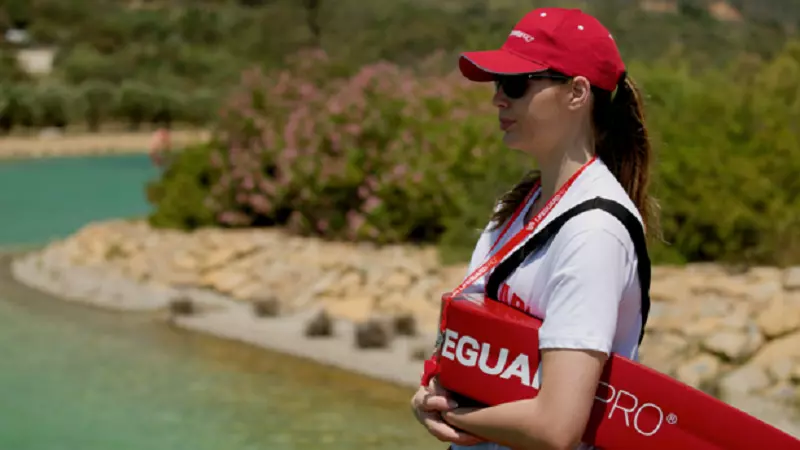While winter may not be the season typically associated with water activities, it’s essential to bear in mind that water safety remains a constant priority throughout the year. The winter season, particularly in colder regions, presents distinctive challenges in this regard.
Water safety professionals play a vital role in ensuring that people continue to enjoy aquatic activities safely during this season.
The Importance of Lifeguard Training
Lifeguard training in the USA and in other states is designed to prepare individuals for various scenarios, including those that may occur during the winter season. These dedicated professionals undergo rigorous training to become proficient in water rescue techniques, first aid, and CPR. They encounter difficulties year-round, particularly in winter when icy waters and frigid temperatures introduce additional risks to their expertise
Winter Water Hazards
Winter water hazards can catch people off guard. Lakes and rivers freeze, creating a potentially deadly illusion of a solid surface. Even individuals with swimming expertise can encounter dangerous circumstances when they venture onto frozen bodies of water.
The risk of hypothermia is a genuine concern, as frigid water can swiftly drain the body’s warmth, resulting in reduced coordination, and in severe instances, loss of consciousness.
Responding to Winter Emergencies
Lifeguard classes near me offer training specifically tailored to address winter water emergencies. These classes teach water safety professionals how to respond swiftly and effectively when someone falls through ice or encounters other cold-water-related emergencies. Swift response is essential in such circumstances, as timely intervention is paramount in averting potential disasters.
Winter Swimmers and Ice Skaters
Some individuals enjoy winter swimming or ice skating on frozen lakes and ponds. These activities can be exhilarating but also pose risks. Water safety professionals monitor these areas, ensuring that the ice is thick enough to support the weight of individuals safely. They also keep an eye out for signs of distress and are prepared to respond immediately if someone encounters difficulties.
Ice Rescue Techniques
Ice rescue techniques are a critical part of a lifeguard’s winter skillset. These professionals are trained to use specialized equipment, such as ice rescue suits and throw ropes, to aid in rescues. Their training also includes strategies for maintaining their own safety while performing a rescue on ice, as the risk of becoming a victim themselves is very real.
Educating the Public
Water safety experts have a crucial role in informing the public about the perils linked to winter water activities. Their efforts revolve around increasing awareness concerning the hazards of ice-related pursuits and promoting the importance of precautionary measures.
This includes advising people to always check the thickness of the ice before venturing onto frozen bodies of water and to avoid swimming in extremely cold conditions.
Beach Patrols in Winter
In coastal regions, patrols on the beaches persist throughout the winter season. While beachgoers are fewer in number, the risks are still present. Water safety professionals on beach patrol duty must remain vigilant, monitoring for swimmers who may underestimate the cold water’s dangers.
They are also prepared to respond to emergencies promptly, ensuring that even in the winter, the beach remains a safe destination.
Indoor Aquatic Centers
Indoor aquatic facilities provide a secure haven for people looking to engage in water-related activities during the winter season. The water safety experts stationed at these facilities are responsible for maintaining indoor swimming pools diligently and ensuring strict adherence to safety protocols.
Their duties encompass overseeing pool areas, conducting safety inspections, and being ready to respond promptly to any potential incidents.
Holiday Season Challenges
The holiday season brings an increase in festive activities, and for some, this includes cold-water plunges or polar bear swims. These events can draw large crowds, and water safety professionals are essential in maintaining order and ensuring participant safety.
Obtaining a lifeguard certification is frequently mandatory for individuals responsible for supervising such occasions, as they need to be ready to respond to any unforeseen emergencies.
Lifeguard Associations and Winter Safety
Lifeguard associations, like the American Lifeguard Association, are at the forefront of promoting winter water safety. They provide resources and guidance to water safety professionals across the country. These entities organize workshops and seminars centered on specialized winter training. These sessions aim to provide lifeguards with the necessary knowledge and skills to effectively manage emergencies in cold-water scenarios.
Cold Water Challenges
Cold water presents unique challenges for both swimmers and water safety professionals. The shock of cold water immersion can lead to involuntary gasping and disorientation, making it critical for lifeguards to be alert and ready to respond at a moment’s notice.
Properly trained professionals understand the importance of maintaining constant surveillance and being prepared to act swiftly in cold water situations.
Ice Rescue Equipment
To perform their duties effectively in winter, water safety professionals rely on specialized equipment. This includes rescue sleds, ice picks, and life rings designed for icy conditions. These tools aid in reaching and extracting individuals in distress, ensuring that rescue efforts are as safe and efficient as possible.
Community Outreach
Water safety professionals engage in community outreach efforts to educate people about winter water safety. They partner with educational institutions, community hubs, and grassroots organizations to raise awareness and disseminate essential information about maintaining safety during winter water activities. These endeavors play a vital role in accident prevention and ensuring individuals make well-informed decisions.
Final Words
Winter water safety is a vital concern, and water safety professionals play an indispensable role in safeguarding the public during this season. Whether it’s monitoring frozen lakes, responding to emergencies in cold water, or educating communities about the risks, these dedicated individuals are always on the front lines.
The lifeguard training they undergo, whether in California or other regions, provides them with the essential skills and knowledge to confront the distinctive difficulties of winter water safety. Thanks to their dedication, individuals can safely relish aquatic pursuits even during the chilliest months of the year.
Organizations like the American Lifeguard Association groups with a comparable purpose play a crucial role in supporting these professionals, ensuring they have the essential resources to fulfill their vital responsibilities in winter water safety.

